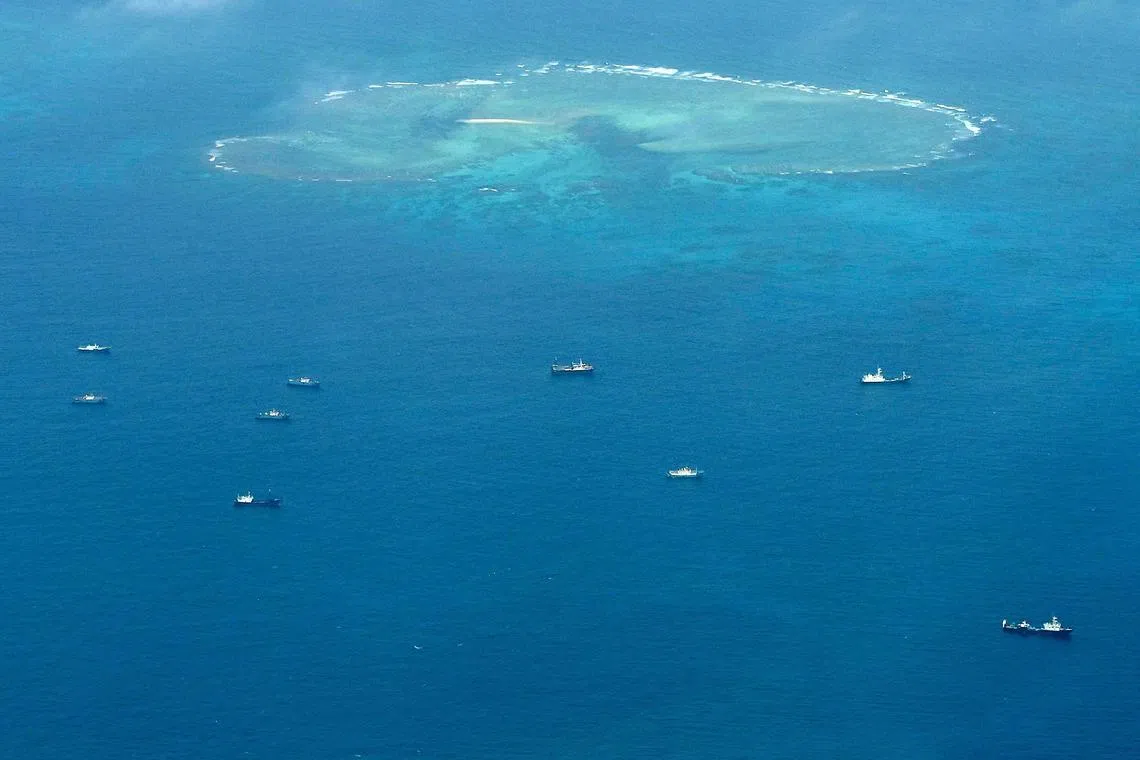Chinese security vessel orders Philippine plane carrying media to leave airspace over Spratlys
Sign up now: Get insights on Asia's fast-moving developments

Vessels identified by the Philippine Coast Guard as Chinese maritime militia vessels seen near Thitu Island in the South China Sea.
PHOTO: AFP
OVER THE SPRATLY ISLANDS – As a Philippine Coast Guard plane carrying journalists flew over the Spratly Islands in the hotly disputed South China Sea, a Chinese voice issued a stern command over the radio: “Leave immediately.”
The order came from a radio operator on a China Coast Guard vessel over 1,000m below – one of dozens of ships seen prowling the waters.
AFP was one of several media outlets given the rare opportunity on Thursday to fly over some of the dozens of tiny islands and reefs where the Philippines, China and several other territories have competing claims.
China claims vast swathes of the South China Sea that overlap with the exclusive economic zones of Vietnam, Malaysia, Brunei, Indonesia and the Philippines. Trillions of dollars in trade flow every year through the waterway, which also contains rich fishing grounds and gas fields.
In the past decade, Beijing has ripped up thousands of hectares of reef
To assert its claims, hundreds of Chinese coast guard and maritime militia vessels patrol the waters. They also try to expel non-Chinese planes from the airspace overhead.
“You have entered (the water around) a Chinese reef and constituted a security threat. To avoid misunderstanding, leave immediately,” the Chinese radio operator said in one of seven messages issued in Chinese and English as the coast guard plane flew over a Philippine-occupied island and shoal.
The Filipino pilot responded that they were flying within Philippine territory.
During the four-hour flight in the Cessna Caravan, Philippine Coast Guard personnel identified nearly 20 Chinese vessels, including what they described as “maritime militia” boats, in waters around some of the nine islands and reefs occupied by the Philippines.
Seventeen boats reported by the Philippine Coast Guard to be Chinese maritime militia vessels were also spotted near Sabina Shoal, which is claimed by Manila.
Fifteen Chinese vessels were seen in the vicinity of Thitu, the largest Philippine-occupied island in the Spratly Islands. Thitu lies about 430km from the major Philippine island of Palawan and more than 900km from China’s nearest major land mass of Hainan Island.
A Chinese navy ship was 15km from the island, while a coast guard vessel was half that distance away, according to estimates provided by the Philippine Coast Guard.
At Second Thomas Shoal, where Philippine marines are stationed in a derelict navy ship grounded to assert Manila’s territorial claim in the waters, a Chinese coast guard vessel was about 11km away, the Philippine authorities said.
In February, a Chinese coast guard boat was nearly 20km from the shoal when it allegedly used a military-grade laser light against a Philippine patrol boat.
That was the latest major maritime incident between the Philippines and China. It sparked a fresh diplomatic row and prompted Philippine President Ferdinand Marcos Jr to take the unusual step of confronting the Chinese Ambassador to Manila.
Mr Marcos has insisted that he will not let China trample on the Philippines’ maritime rights – in contrast to his predecessor Rodrigo Duterte, who was reluctant to criticise Beijing.
The Philippines’ new strategy was to call out China’s “bullying behaviour and aggressive actions”, Commodore Jay Tarriela, the Philippine Coast Guard spokesman for the West Philippine Sea, told a forum in the capital Manila on Wednesday.
Manila refers to the waters immediately to its west as the West Philippine Sea.
The country’s coast guard regularly publishes information, including photos and videos, about Chinese vessels in the waters around Philippine-occupied features.
This helps inform Filipinos and enables other countries and territories to criticise China over its activities, Commodore Tarriela said. And it forces Beijing “to come out in the open to explain or to completely lie”. AFP


